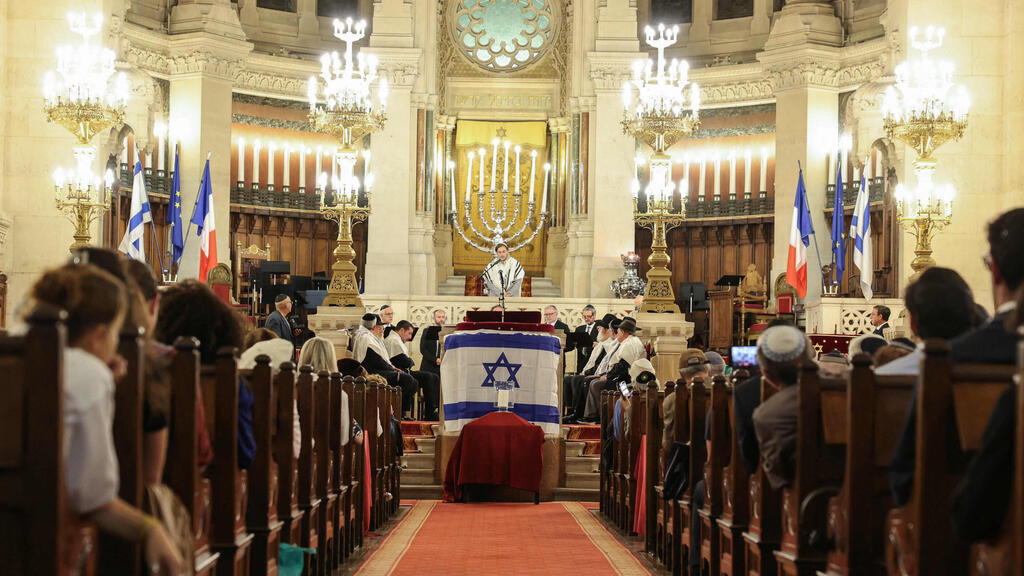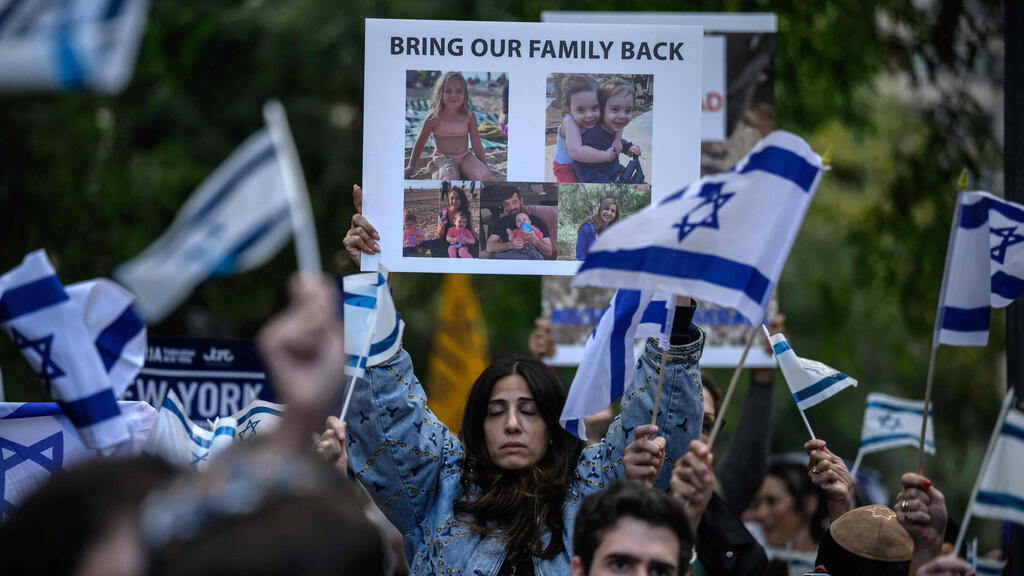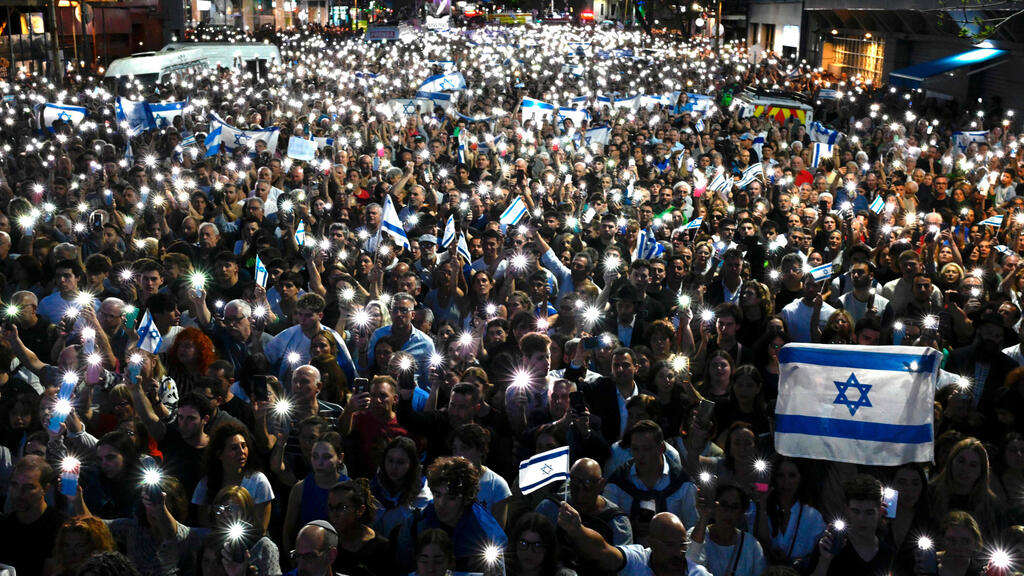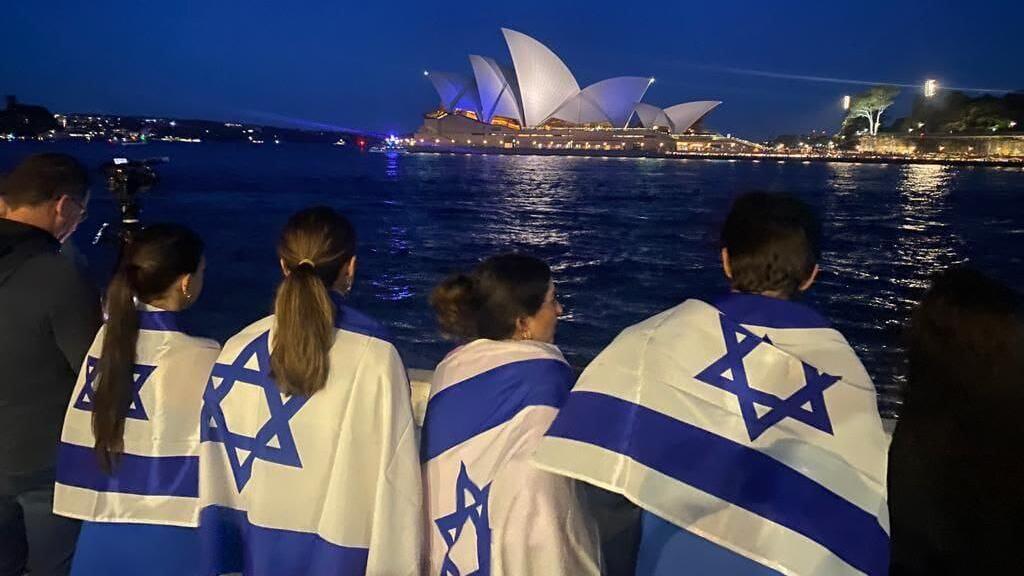This was the week when Diaspora Jews were able to put political differences aside and support Israel without reservations and without fear. The largest communities in the United States and France demonstrated in the streets, and smaller communities also registered a series of solidarity and support events in Jewish centers and synagogues.
Projection of the captives' photos on the UN building
More stories:
The largest event took place in front of the United Nations building in New York, where approximately 30,000 people gathered for a rally in support of Israel, organized by the Jewish Federation of New York (UJA) and its subsidiary JCRC. Among the speakers at the event were New York State Governor Kathy Hochul and Mayor Eric Adams. "We need to destroy Hamas," the mayor said from the stage.
Other large events were also recorded in Paris, Toronto, Buenos Aires and in smaller communities such as Porto in Portugal, Sydney in Australia and Cleveland, Ohio in the United States.
The activity and mobilization in the communities was manifested not only in support rallies, but also in the transfer of resources and equipment to the IDF soldiers and the wounded on the home front. In just a few days, huge sums of money were collected for these purposes, and additional campaigns are in the process of raising funds.
The waves of support were joined by Jewish celebrities from around the world, such as Jerry Seinfeld, Sarah Silverman, Amy Schumer, Sacha Baron Cohen and even Jews who are less politically vocal on normal days such as Mark Zuckerberg.
Ten months of estrangement
So what does all this mean? It turns out that Jewish DNA, the same one that caused almost every Israeli this week to think about how he can contribute and participate in the war effort against those who are coming to destroy us, is transcontinental. Jews in the Diaspora reconnected with their inner identity and found that when there is a threat to the Jewish people or the State of Israel, they stand by it without reservations and without conditions.
Relations with Diaspora Jews have had many ups and downs. There is no doubt that the composition of the government, including its extreme statements and attempts to make dramatic changes in the judicial system, the same system that is admired and appreciated in the world, severely damaged Israel-Diaspora relations. In various communities they refused to meet Finance Minister Bezalel Smotrich and unpleasant incidents were also recorded during the visits of the minister in charge of the judicial overhaul, the head of the Knesset’s Constitution, Law and Justice Committee Simcha Rothman, and Diaspora Minister Amichai Chikli.
Prior to the war, there were government ministers and members of Knesset who called for a reexamination of relations with the US, and harshly criticized Biden, the president elected by the majority of American Jews. The move toward a more rigid Orthodox Judaism, without openness to other streams of Judaism that are popular in the US, caused further distancing from the largest Jewish community in the world.
4 View gallery


Rabbi Moshe Sabag in a speech in support of Israel at the Great Synagogue in Paris France
(Photo: Thomas Samson / AFP)
Even the visits abroad of the "Prime Minister of all Jews," as Benjamin Netanyahu has called himself in the past, did not constitute a bridge to Diaspora Jewry, since most of them were accompanied by large demonstrations by opponents of the judicial reform, causing many of the Jewish communities to refuse to meet with him or to join the demonstrators demanding that he not harm Israeli democracy. In addition to the controversial reform, there are still many other disputes with the Jews of the Diaspora, mainly surrounding attempts to amend the Law of Return, non-Orthodox worship at the Western Wall and the issues around conversion.
Needed: A 'new contract' with Diaspora Jews
Just as many Israelis put aside their differences and immediately enlisted in the army reserves or to provide support on the home front, so Diaspora Jews immediately "forgot" all their differences and stood by Israel.
When you reach an existential war and when Israeli citizens are massacred in their homes, all of these issues suddenly seem much less important. The Jews of the Diaspora reconnected with the ethos on which the Jewish state was founded and proved again their strength, not only in supporting Israel in the streets, but also in providing resources, and - perhaps even more importantly - in broad political support and pressure on their own governments, which currently are giving Israel a free hand to deal with the threat from Gaza.
Where does it all go from here? Perhaps in the spirit of the "new contract" that many Israelis have been talking about in recent months, we need to understand that Diaspora Jews are an inseparable part of us. They stand by us in times of need, are mobilized and help as much as possible. We, for our part, need to stop treating them sometimes as an ATM, respect their positions, listen to them, embrace them and give them the feeling that this is also their home. Of course, there may be disagreements and we may not agree on everything, as in the best families. But the last week proved once again: We are brothers - and we should not forget that, even in times of peace.
Thousands of Jews sing the Israeli national anthem in Toronto







